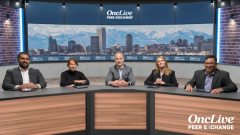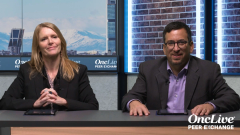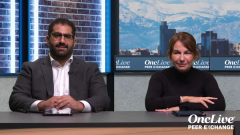
NSCLC: PD-L1 Expression and Treatment Decision-Making
Clinical insights on how the level of PD-L1 expression informs treatment decisions for patients with non–small cell lung cancer.
Episodes in this series

This is a synopsis of a Peer Exchange video series featuring Benjamin P. Levy, MD, of Sidney Kimmel Comprehensive Cancer Center at Johns Hopkins; Solange Peters, MD, PhD, of University Hospital of Lausanne; Joshua K. Sabari, MD, of NYU Langone’s Perlmutter Cancer Center; Edward B. Garon, MD, MS, of UCLA Jonsson Comprehensive Cancer Center; and Marina Chiara Garassino, MD, of University of Chicago Medicine Comprehensive Cancer Center.
The panel discussed whether to use immunotherapy alone or chemoimmunotherapy for patients with stage IV NSCLC [non–small cell lung cancer] with PD-L1 expression above 50%. Dr Garon said higher PD-L1 levels correlate with greater likelihood of benefit from immunotherapy, so he may use pembrolizumab monotherapy more for levels above 70% to 90% versus 50%. He is cautious using monotherapy in never-smokers, who seem to derive less benefit from PD-1 inhibitors alone per the data.
Dr Sabari agreed, noting he often adds chemotherapy for squamous histology and uses clinical factors to personalize first-line treatment. Dr Peters cautioned that a third of patients progress on pembrolizumab monotherapy in trials, so ensuring fitness for subsequent chemotherapy is important if not using upfront chemoimmunotherapy. Dr Levy remarked that chemoimmunotherapy and pembrolizumab alone have similar outcomes for PD-L1 greater than 50% patients in subset analyses from KEYNOTE-024 and KEYNOTE-189.
In conclusion, the experts emphasized that patient factors like smoking status, gender, histology, and disease burden help guide optimal first-line regimen in PD-L1–positive NSCLC. If not using initial chemoimmunotherapy, sequencing to chemotherapy after progression on PD-1 inhibitors remains critical.
*Video synopsis is AI-generated and reviewed by OncLive editorial staff.







































